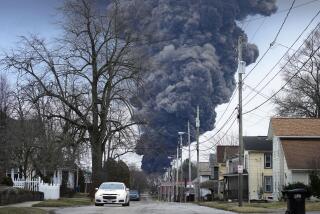Disaster in Bhopal Laid to Sabotage : Study Blames Worker at Carbide Facility
- Share via
LONDON — A U.S. consultant firm’s report into the 1984 toxic gas disaster that killed at least 2,000 people at Bhopal, India, backs Union Carbide Corp.’s contention that it was caused by sabotage.
A report presented Tuesday to a London conference by Ashok Kalelkar, an Indian-born engineer with Arthur D. Little Inc., said tampering by a disgruntled employee at the Bhopal pesticide plant caused the accident.
The disaster, the worst industrial accident in history, occurred in December, 1984, when toxic gas clouds swept across the central Indian city, killing at least 2,000 people and injuring another 200,000.
More than 500,000 people have filed claims in the case, and the Indian government filed criminal charges against Carbide in December.
Method Outlined
The consultant’s report was highly critical of the Indian government, saying it stuck to the negligence theory despite evidence to the contrary and hindered Union Carbide’s ability to discover what actually happened.
The company finally got access to key plant records and through them the names of plant employees when a U.S. magistrate ordered India to produce copies of the documents as part of the civil suit to which it was a party.
The report was based on interviews with more than 70 former employees of the now-closed plant.
The consultant said evidence showed that an employee hooked a rubber hose to a storage tank and introduced water that caused the emission of toxic gas when it interacted with the methyl isocyanate (MIC) in the tank to form carbon dioxide.
The chemical produces a deadly gas when mixed with water.
“It is clear that the incident was caused by the entry of water to the tank through a hose that had been connected directly to the tank,” Kalelkar said in presenting the report.
The intention was “contamination and spoiling of the tank’s contents,” Kalelkar said.
More to Read
Sign up for Essential California
The most important California stories and recommendations in your inbox every morning.
You may occasionally receive promotional content from the Los Angeles Times.













